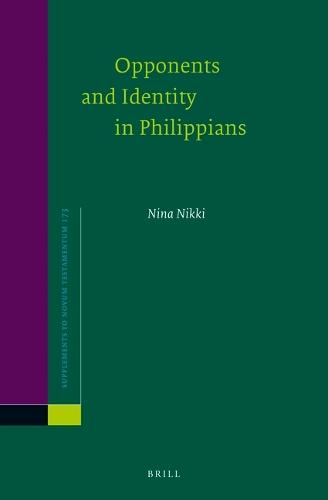Overview
Guided by awareness of the problematic relationship between polemical text and history, Opponents and Identity in Philippians seeks to establish a historical context for the letter to the Philippians. The study re-evaluates the relationship between Paul and the Jerusalem-based Christ-believing community from the time of the Jerusalem meeting and the Antioch incident. A more detailed analysis centers on how this relationship is reflected in Philippians. The book argues that Paul was continuously on problematic terms with the Jerusalem community, which means that they are the Jewish Christ-believing opponents referred to at several places in Philippians as well. With the help of the social identity approach (SIA), the book illustrates how Paul engages in identity formation through polemical rhetoric in his last letter.
Full Product Details
Author: Nina Nikki
Publisher: Brill
Imprint: Brill
Volume: 173
Weight: 0.579kg
ISBN: 9789004382954
ISBN 10: 900438295
Pages: 268
Publication Date: 11 October 2018
Audience:
Professional and scholarly
,
College/higher education
,
Professional & Vocational
,
Postgraduate, Research & Scholarly
Format: Hardback
Publisher's Status: Active
Availability: Available To Order

We have confirmation that this item is in stock with the supplier. It will be ordered in for you and dispatched immediately.
Reviews
"""N. legt eine beeindruckende Studie vor, die nicht nur formal durch sprachliche Präzision und logische Stringenz anspricht, sondern auch einen bestechend konsistenten Gesamtentwurf darstellt. (...) Generell ist SIA ein überaus faszinierendes Modell, das neue, erfrischende Einsichten eröffnet."" - Gerhard Hotze, Philosophisch-Theologische Hochschule Münster, Biblische Zeitschrift 64 (2020). ""Insgesamt handelt es sich bei der Studie Nina N.s um eine spannende Spurensuche, die eine Vielzahl neuer Perspektiven eröffnet und verschiedene Möglichkeiten historischer und auch exegetischer Art plausibilisiert."" - Robert Vorholt, Universität Luzern, Theologische Revue, 117 (2021)."
N. legt eine beeindruckende Studie vor, die nicht nur formal durch sprachliche Prazision und logische Stringenz anspricht, sondern auch einen bestechend konsistenten Gesamtentwurf darstellt. (...) Generell ist SIA ein uberaus faszinierendes Modell, das neue, erfrischende Einsichten eroeffnet. - Gerhard Hotze, Philosophisch-Theologische Hochschule Munster, Biblische Zeitschrift 64 (2020). Insgesamt handelt es sich bei der Studie Nina N.s um eine spannende Spurensuche, die eine Vielzahl neuer Perspektiven eroeffnet und verschiedene Moeglichkeiten historischer und auch exegetischer Art plausibilisiert. - Robert Vorholt, Universitat Luzern, Theologische Revue, 117 (2021).
N. legt eine beeindruckende Studie vor, die nicht nur formal durch sprachliche Prazision und logische Stringenz anspricht, sondern auch einen bestechend konsistenten Gesamtentwurf darstellt. (...) Generell ist SIA ein uberaus faszinierendes Modell, das neue, erfrischende Einsichten eroeffnet. - Gerhard Hotze, Philosophisch-Theologische Hochschule Munster, Biblische Zeitschrift 64 (2020).
Author Information
Nina Nikki, Th.D., is a post-doctoral researcher at the University of Helsinki and the co-editor of Others and the Construction of Early Christian Identities (The Finnish Exegetical Society, 2013).




